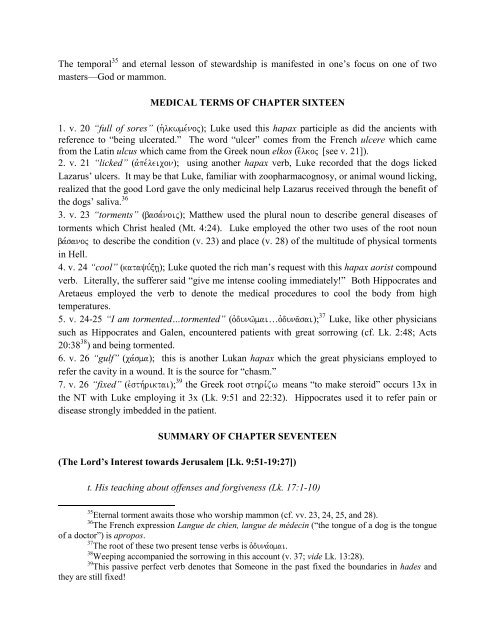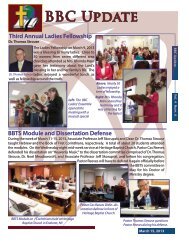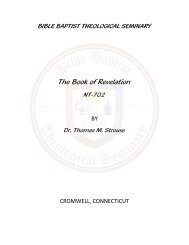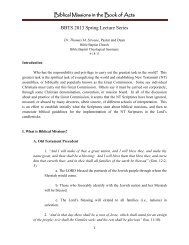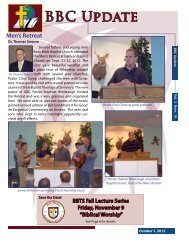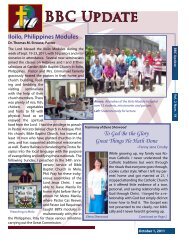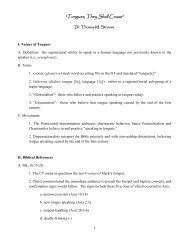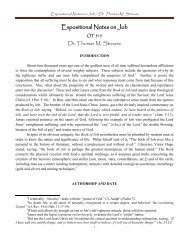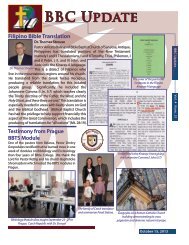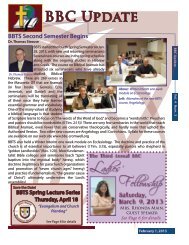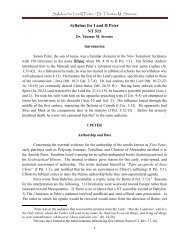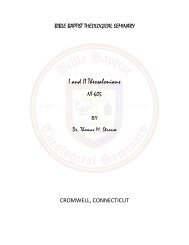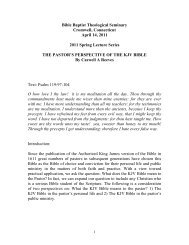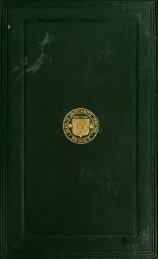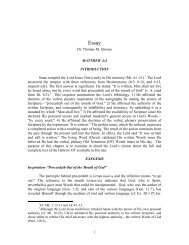Commentary on Luke's Gospel with Emphasis on Medical Terms
Commentary on Luke's Gospel with Emphasis on Medical Terms
Commentary on Luke's Gospel with Emphasis on Medical Terms
You also want an ePaper? Increase the reach of your titles
YUMPU automatically turns print PDFs into web optimized ePapers that Google loves.
The temporal 35 and eternal less<strong>on</strong> of stewardship is manifested in <strong>on</strong>e’s focus <strong>on</strong> <strong>on</strong>e of two<br />
masters—God or mamm<strong>on</strong>.<br />
MEDICAL TERMS OF CHAPTER SIXTEEN<br />
1. v. 20 “full of sores” (h`lkwme,noj); Luke used this hapax participle as did the ancients <strong>with</strong><br />
reference to “being ulcerated.” The word “ulcer” comes from the French ulcere which came<br />
from the Latin ulcus which came from the Greek noun elkos (e[lkoj [see v. 21]).<br />
2. v. 21 “licked” (avpe,leic<strong>on</strong>); using another hapax verb, Luke recorded that the dogs licked<br />
Lazarus’ ulcers. It may be that Luke, familiar <strong>with</strong> zoopharmacognosy, or animal wound licking,<br />
realized that the good Lord gave the <strong>on</strong>ly medicinal help Lazarus received through the benefit of<br />
the dogs’ saliva. 36<br />
3. v. 23 “torments” (basa,noij); Matthew used the plural noun to describe general diseases of<br />
torments which Christ healed (Mt. 4:24). Luke employed the other two uses of the root noun<br />
ba,sanoj to describe the c<strong>on</strong>diti<strong>on</strong> (v. 23) and place (v. 28) of the multitude of physical torments<br />
in Hell.<br />
4. v. 24 “cool” (katayu,xh|); Luke quoted the rich man’s request <strong>with</strong> this hapax aorist compound<br />
verb. Literally, the sufferer said “give me intense cooling immediately!” Both Hippocrates and<br />
Aretaeus employed the verb to denote the medical procedures to cool the body from high<br />
temperatures.<br />
5. v. 24-25 “I am tormented…tormented” (ovdunw/mai…ovduna/sai); 37 Luke, like other physicians<br />
such as Hippocrates and Galen, encountered patients <strong>with</strong> great sorrowing (cf. Lk. 2:48; Acts<br />
20:38 38 ) and being tormented.<br />
6. v. 26 “gulf” (ca,sma); this is another Lukan hapax which the great physicians employed to<br />
refer the cavity in a wound. It is the source for “chasm.”<br />
7. v. 26 “fixed” (evsth,riktai); 39 the Greek root sthri,zw means “to make steroid” occurs 13x in<br />
the NT <strong>with</strong> Luke employing it 3x (Lk. 9:51 and 22:32). Hippocrates used it to refer pain or<br />
disease str<strong>on</strong>gly imbedded in the patient.<br />
SUMMARY OF CHAPTER SEVENTEEN<br />
(The Lord’s Interest towards Jerusalem [Lk. 9:51-19:27])<br />
t. His teaching about offenses and forgiveness (Lk. 17:1-10)<br />
35<br />
Eternal torment awaits those who worship mamm<strong>on</strong> (cf. vv. 23, 24, 25, and 28).<br />
36<br />
The French expressi<strong>on</strong> Langue de chien, langue de médecin (“the t<strong>on</strong>gue of a dog is the t<strong>on</strong>gue<br />
of a doctor”) is apropos.<br />
37<br />
The root of these two present tense verbs is ovduna,omai.<br />
38<br />
Weeping accompanied the sorrowing in this account (v. 37; vide Lk. 13:28).<br />
39<br />
This passive perfect verb denotes that Some<strong>on</strong>e in the past fixed the boundaries in hades and<br />
they are still fixed!


